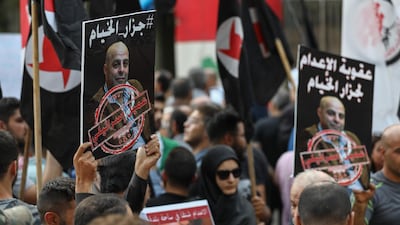A Lebanese-American man was referred Friday to prosecutors after confessing he’d worked for Israel during its occupation of Lebanon for nearly two decades, a Lebanese security agency said.
Amer Fakhoury was arrested Thursday after returning to his native Lebanon from the United States.
He had worked as a senior warden at the Khiam Prison in southern Lebanon that was run by an Israeli-backed militia, known as the South Lebanon Army (SLA), until Israel ended an 18-year occupation of the area in 2000.
The SLA had an estimated 2500 soldiers at the peak of its membership, but largely disintegrated after Israel’s withdrawal.
Human rights groups have said in the past that Khiam prison was a site of torture and detention without trial before it was abandoned in 2000. Israel denies the allegations.
The former inmates joined nearly a hundred demonstrators on Thursday outside the Ministry of Justice in Beirut, where they condemned Fakhoury's return to Lebanon, calling him a "butcher."
"Not a single person held in Khiam was spared physical and psychological torture," said Abbas Kabalan, who was detained there from 1987 to 1988.
"Fakhoury used to issue direct orders for the torture of inmates," Kabalan added, accusing him of also taking part in beatings.
Hilal Salman, another former inmate, blames Fakhoury for his brother's death.
"My father and mother and brother were all held in Khiyam," he told AFP at the protest.
"My brother was killed there in 1989 because of a gas bomb thrown at inmates on the orders of two prison heads, including Amer Fakhoury."
Lebanon and Israel have been officially at war since Israel’s creation in 1948.
The Lebanese General Security Directorate said Friday that Fakhoury used an Israeli passport before Israel’s withdrawal to travel from Israel to the US, but the country’s parliament speaker Nabih Berri questioned how he was able to enter Lebanon.
“It requires an immediate security and judicial investigation to find out what happened, and this cannot be ignored,” newspaper Al Akhbar quoted Mr Berri as saying.
Hundreds of former Lebanese members of the SLA had fled to Israel, fearing reprisals if they remained in Lebanon. Others stayed and faced trial, receiving lenient sentences. Mr Fakhoury’s case could set a precedent for returning SLA members.
Finance Minister Ali Hassan Khalil, a Hezbollah ally, tweeted Friday that the Lebanese people “will not forgive” those who pained them.
Mr Khalil said there are attempts to clear the names of “60 agents for Israel” and “we should take this very seriously” and follow the case.
Lebanese Army chief General Joseph Aoun was faced with awkward questions about Fakhoury on Friday after photos emerged on social media of the pair posing together at an embassy reception in the US.
The Army Command said the photos “were taken during General Aoun's visit to the US in October 2017, during a reception ceremony held in his honor by the Lebanese Embassy," adding that many guests took photos with the general that evening.

